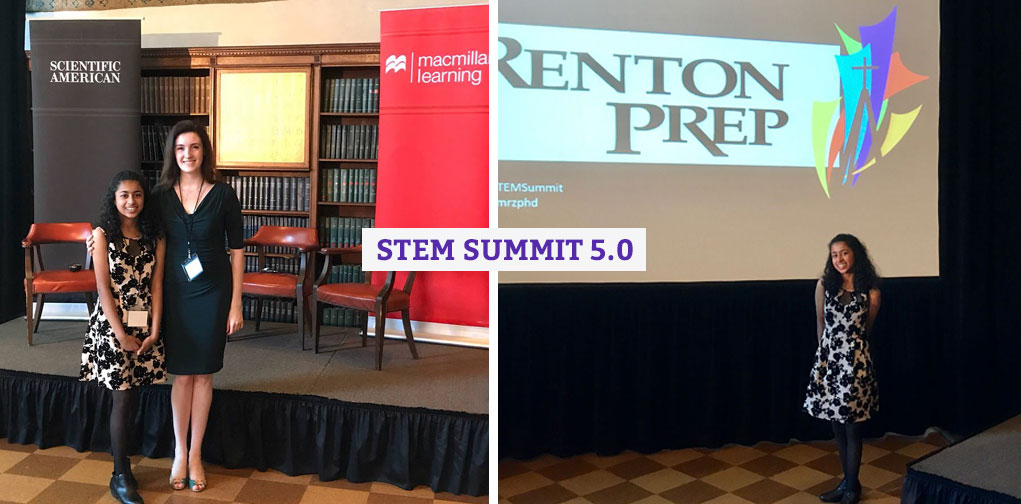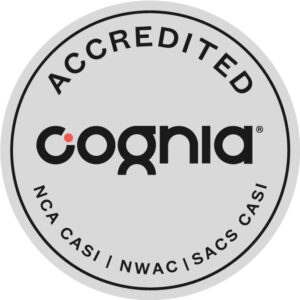
Perhaps one of the biggest challenges I face as an educator is how to make all subjects relevant to my students. It is becoming increasingly important for students to think critically. Gone are the days of simply memorizing dates and formulas. The students of today and the leaders of tomorrow must learn how to address complex issues across multiple subjects. As an educator, it is my job to help not only bring these subjects to life, but to also provide context so that students can understand and interpret the lessons easily.
This year, Renton Prep was once again asked to participate in the STEM Summit. The STEM Summit 5.0 is sponsored by Macmillan Learning and Scientific American. It is an event designed to inspire the forward-thinking leaders of the future. For the 2017 Summit, I developed a presentation with some of my students focusing on the far-reaching affects of Artificial Intelligence in industries ranging from policy to healthcare. Below is an overview of what we presented.
Quote: “The fault, dear Brutus, is not in our stars, but in ourselves, that we are underlings.”
As I teach, I want students to make connections across domains that don’t necessarily make sense together at first glance. Many of them were familiar with the book and/or movie adaptation, Fault in Our Stars, (John Green). So, our discussion started there. I wanted them to draw connections and contrasts between that story and Julius Caesar, (Shakespeare). This was part of our preparation to see a live staging of the play. We discussed context, tragedy, and why Shakespeare’s works hit on something timeless about the Human Condition. I also brought in a TED Talk on Hip Hop and Shakespeare to introduce iambic pentameter.
In that TED Talk, Akala creates a level of cognitive dissonance. He challenges what people thought they knew. He exposes biases toward assumed understandings in seemingly disparate contexts and styles of communicating. I asked my students what any of this has to do with thought process other than showing iambic pentameter. That started the discussion on his phrase about “custodians of knowledge.” How do we empower students through education to become custodians of knowledge? They have access to a wealth of knowledge through the Internet. If that’s the case, what’s the point of teachers? As observed by this article from Forbes Magazine, the true value in humans acting as custodians of knowledge is the ability to use the knowledge effectively and look for counterexamples – two traits that do not come naturally to most.
Building upon these concepts, I told my students that there is a prediction that in 20 years, 47% of current jobs will be replaced by robots. That started the conversation with assumptions about what students thought humans were capable of that robots couldn’t do. I wanted them to parallel concepts of assumptions like in the TED Talk. It’s easy to say, “I learned not to question assumptions about what I know and what exists after watching the TED Talk on Shakespeare and Hip Hop.” However, I wanted to push for transfer of learning into a seemingly dissimilar domain. I was looking to help get the students back into a place of cognitive dissonance.
After they discussed what they thought robots could and could not do, and what was uniquely human, I showed them the video Humans Need Not Apply. As a result, a fascinating conversation ensured that essentially boiled down to, “But robots still can’t perform surgery because they are too clunky and can’t do the work of human hands.” I unfortunately had to dispel that myth by showing them this video of a da Vinci robot suturing a grape.
I know I’ve made impact when students get to a point of saying things like, “That completely changed my perspective,” or, “I think differently now than I did before,” or “Well … if that’s possible then what about …”
I asked them what any of this has to do with studying Julius Caesar, and why that could possibly be relevant to us still. If machines have the capability of taking over so much, and that’s an old story, why would we bother?
We talked about the political system and themes in Julius Caesar; topics included ethics, power, dictatorship, and the question of what freedom means. This brought the discussion into the present in a very real way for all of the students.
Furthermore, we discussed current societies, including how freedom of speech and challenging assumptions and ideas can lead to innovative approaches. However, these challenges can also lead to conflict. For instance, with such freedom comes a responsibility on our shoulders to maintain a balance where people of all creeds remain safe. This was explored by having the students grapple with developing classroom policies that would help create a culture of innovation. We also gave students the freedom to speak while ensuring chaos did not ensue. Then, students had to discuss how to enforce those new policies fairly.
I tied the discussion back to innovation like AI and other ethical questions that are likely to arise more often. We talked about the need for people in the coming years to focus on policy and ethics surrounding these topics, much like Human Subjects review boards for experiments. Many of the procedures in place now don’t account for AI.
Finally, we again discussed the line, “The fault in our stars, dear Brutus, is not in ourselves, but that we are underlings.”
So, we are left with some important questions. Some of these questions, for instance are as follows. What does this mean to us in different times, places, contexts, and settings? How will the advancement of technology around us impact the human condition? How do we define being an underling and what does that mean? Why does protecting things for the good of society matter? How can creating something to protect people lead to others using that same tool to isolate and divide or harm? What should we protect? How do we maintain a democratic society where innovation can flourish and people can still stay safe? What skills will you need in the future to be able to navigate huge amounts of information? How will you adapt to new technologies, knowing that robots may be able to replace upwards of 40% of jobs that currently exist today? How can the benefits of AI and big data became an allusion from Julius Caesar? Our presentation continued to include issues with AI as they might apply to healthcare and other industries. I will write a separate blog post to cover those topics.
If you want to learn more about STEM Summit 5.0, Renton Prep or how we are shaping the leaders of tomorrow, please contact us today.

